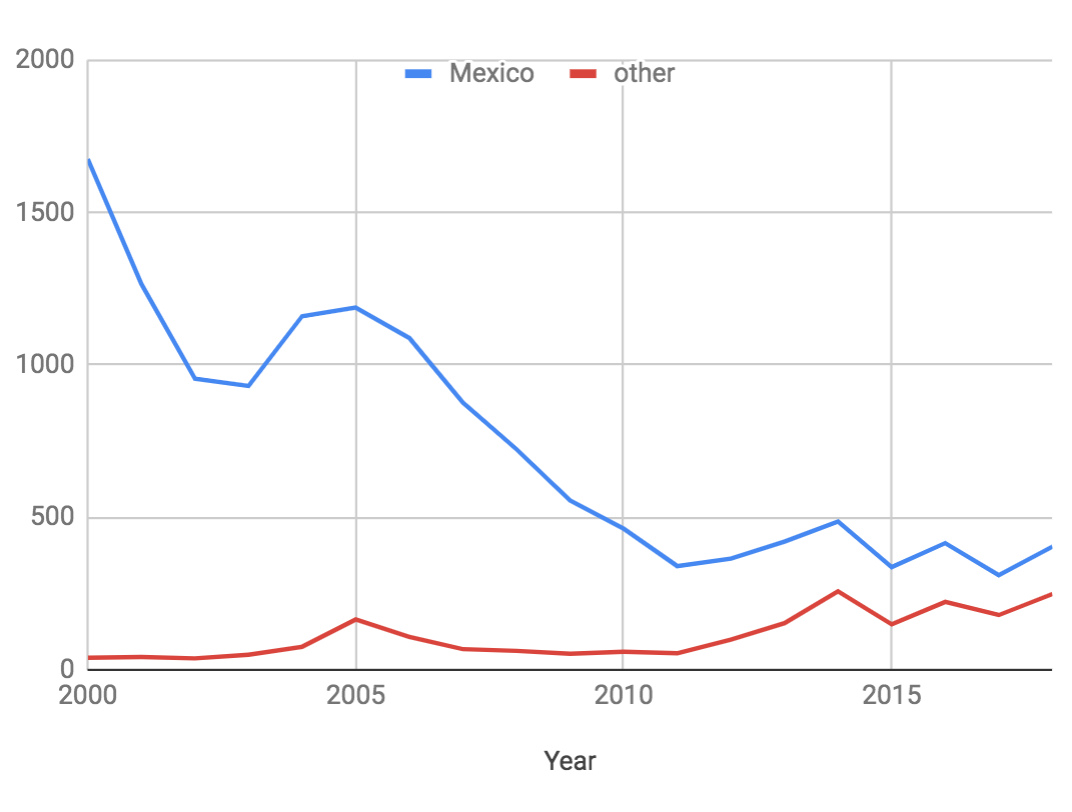|
Today's Opinions, Tomorrow's Reality
Shameful Collaboration By David G. Young Puerto Morelos, Mexico, April 9, 2019 -- Mexico's rise from poverty was built on migration to America. Now Mexico's working to stop Central America from doing the same. The nearest border separating the southern Mexican States from the Guatemalan frontier is often hard to discern. An imaginary line passes through hundreds of miles of unguarded rainforest from Belize to the Ucumacinta River. The one road crossing in the area, near Gracias a Dios, has become a popular route for migrants from Central America heading to the United States.1 Policing migrants on its southern border is a new thing for Mexico. For the last 50 years, it has been Mexico that has sent many millions of migrants northward in search of opportunity. Some of those migrants settled in the United States, but most came back after just a few years working in the country, sending much of their paychecks back to their home villages via Western Union. These remittances have done amazing things to lift Mexicans out of poverty. The past few decades has seen Mexico become a mostly middle-class country. For all the news reports (many true) about violent Mexican drug cartels murdering their rivals, a quiet revolution has been taking place. Wal-Marts and Cherdraui Supermarkets have spread like wildfire around the country, and access to credit has given average Mexicans the ability to buy cars and household appliances that their parents could only have dreamed about.
Thanks to newly comfortable lives, Mexicans just aren't heading north like they used to. Apprehensions of Mexican nationals by the U.S. Border Patrol declined from 1.6 million per year in 2000 to just over 0.4 million last year.2 These statistics make a mockery of the Trump Administration's recent declaration of an emergency on the southern border. Total apprehensions from all countries last year are many times lower than what were in the early 2000s. But while Mexican migration has declined markedly, it has been partly offset by growth in migrants from Central America. Apprehensions of migrants from Guatemala, Honduras and El Salvador -- Mexico's southern neighbors -- have been steadily growing over the last decade. Apprehensions of non-Mexican immigrants by the Border Patrol hit a record 248,000 last year.3 Poverty is what primary drives Central American migrants much like their Mexican cousins. But violence from gangs in the often lawless slums of San Pedro Sula, Guatemala City, and San Salvador are a huge factor, too. These migrants must get across Mexico's southern border before they can cross America's southern border. America's anti-immigrant administration knows this. Last month, President Trump threatened to close the border with Mexico if the country didn't do more to stop the flow of Central Americans. Caving to the pressure, Mexico's new populist President Andrés Manuel López Obrador has collaborated with Trump on immigration. Shortly after taking office, he agreed to hold Central Americans seeking asylum in the United States in Mexico during the application process.4 His quiet negotiations with America -- making who knows what promises -- have now seen Trump back off his latest threat to close America's southern border. Clearly, AMLO faces immense risks both to Mexico's newfound economic success and to his political future by Trump's threats to close the border and start a trade war. That a Mexican politician would be willing to throw poor Central Americans under the bus is no surprise. But given the benefits of Mexico's own history of mass migration to America, AMLO's collaboration with Trump against poor Central Americans is all the more shameful. Related Web Columns: Brunching in Querétaro, April 3, 2018 Red State Tortillas, February 27, 2017 Notes: 1. National Public Radio, Coyotes' Boomtown: Picking Up The Migrant Trail On The Way To The U.S.-Mexico Border, April 8, 2019 2. US Border Patrol, Apprehensions From Mexico and Other Than Mexico (FY 2000 - FY 2018), as posted April 9, 2019 3. Ibid. 4. The Hill, Mexico is Learning That if You Give Trump an Inch, He'll Take a Mile, April 4, 2019 |

